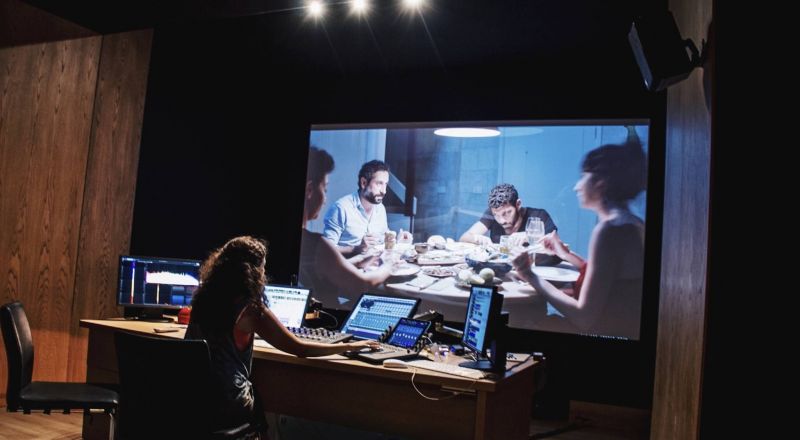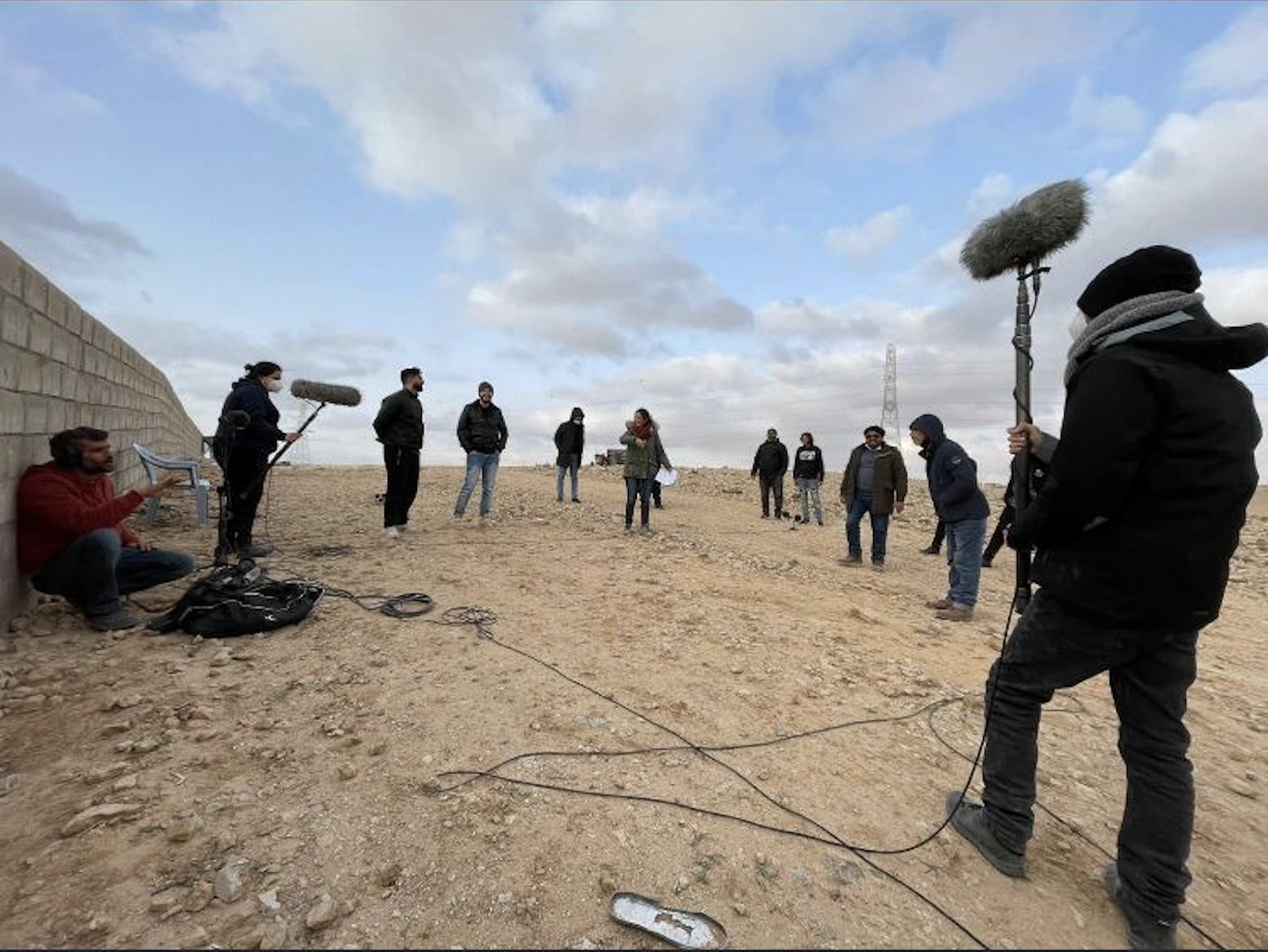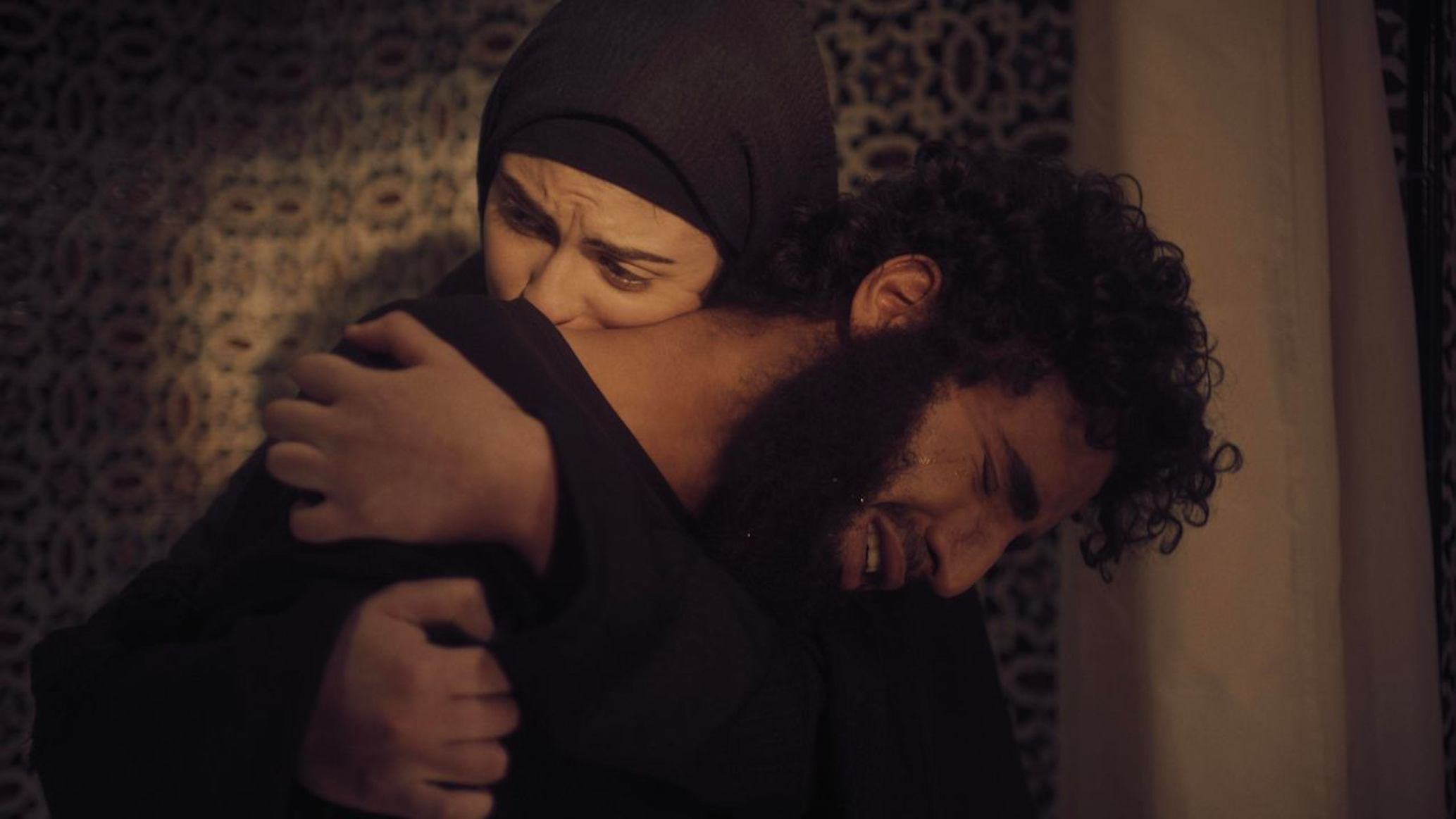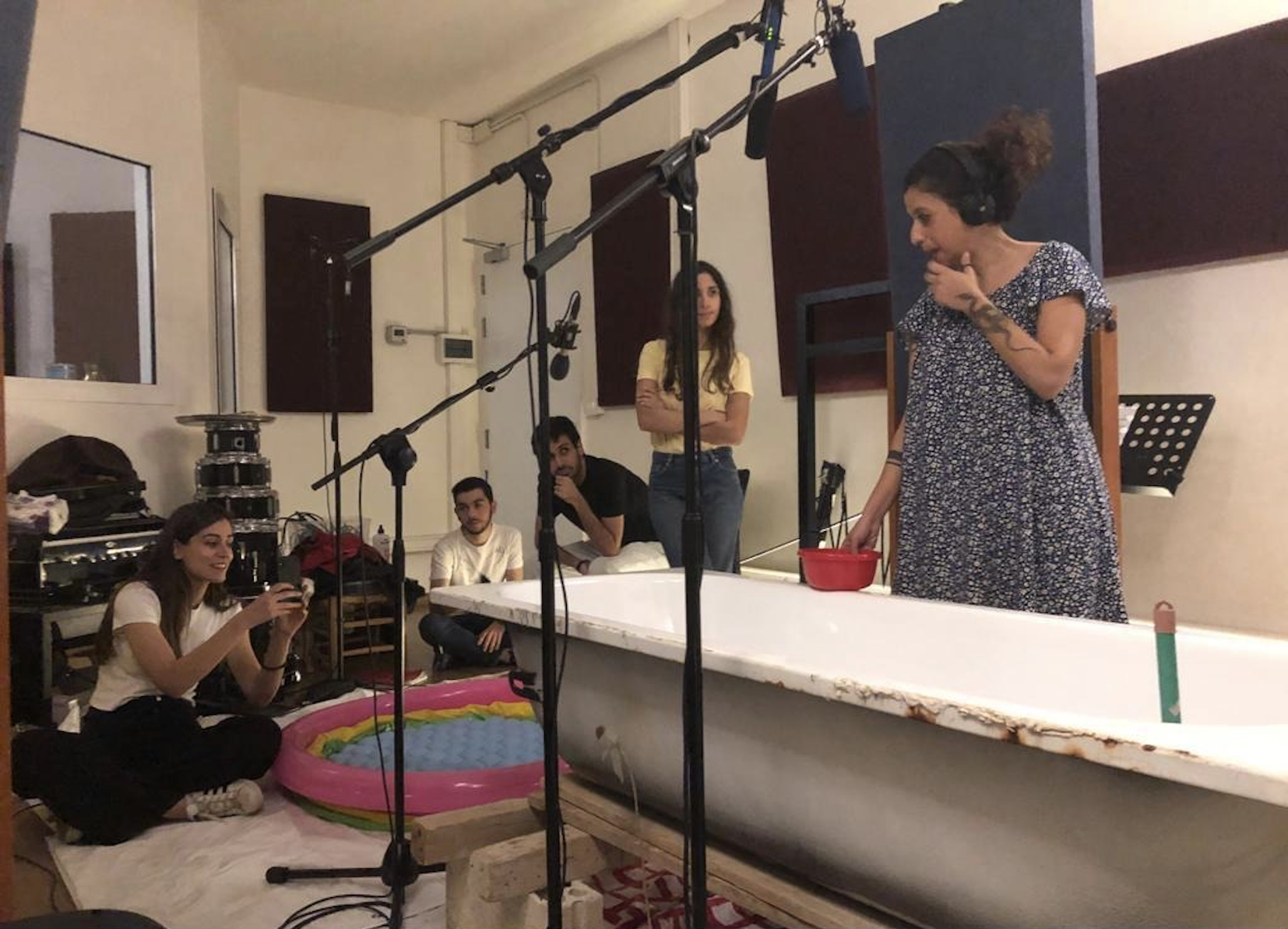
Eid editing the sound of Roy Dib’s ‘The Beach House.’ (Credit: Courtesy of DB Studios)
BEIRUT — In mid-June 2023, during a parliamentary session to elect Lebanon’s next president, Parliament Speaker Nabih Berri’s actions left a deep impression on Rana Eid.
“He did something highly symbolic,” she recalls. “MPs were telling him that there’s a vote missing. He said, ‘It doesn’t matter.’ Then he turned off the microphone, and the broadcast and the image. In three seconds or less, Parliament went mute. The Speaker & Co, they’re muting us, and we’re letting them get away with it.”
Eid is sitting with L’Orient Today in one of DB Studios’ editing suites, the audio post-production and music production facility she co-founded with composer and filmmaker Nadim Mishlawi in 2006. In the absence of the visual or aural distractions that usually muddy recordings of such interviews, her voice seems all the more fierce.
“In Arabic, you know, ‘sawt’ is not only ‘sound,’” she says. “It’s ‘vote,’ ‘voice,’ ‘noise.’ When I saw that on TV, how he muted everything with just one click, I cried for like half an hour. Then I asked myself, ‘Why am I crying? I don’t care. I know that they’re gonna do that.
“One day I will work on this sonic gesture,” she says. “I have to finish what I’m doing right now, then I’m gonna do something with his performance.”
Eid has a lot on her plate in the meantime. To date, she has at least 65 features and series under her belt. Since 2010 she’s been credited as sound designer or sound editor in some of the Arab world’s more distinguished art-house and indie productions — docs and fictions. Several of the projects she’s worked on have taken treasure at international film festivals and a number have been in contention for that most-fetishized movie bauble, the Oscar.
 The DB Studios team in Amman, Jordan recording sound for Adil El Arbi and Bilall Fallah’s ‘Rebel.’ (Credit: Courtesy of DB Studios)
The DB Studios team in Amman, Jordan recording sound for Adil El Arbi and Bilall Fallah’s ‘Rebel.’ (Credit: Courtesy of DB Studios)
In recent years Eid has found time to work on her own projects. Her award-winning feature-length nonfiction, Panoptic, 2017, mingles personal essay with the filmmaker’s fascination with residues of the long Civil War in the city’s urban fabric.
In the wake of the 2020 Beirut port blast, Eid was one of 15 filmmakers to participate in Beirut 6:07, a portmanteau series about the disaster produced by MBC’s Shahid streaming service. Titled “Undead,” her piece is the least melodramatic of the contributions.
The short centers on five stories from the Civil War recounted by two voices. The footage shows nothing of the ammonium nitrate’s mushroom cloud or the ecstasy of chaos that followed. Instead it draws on some unused rushes from Panoptic. Like the voices and stories, the images are superimposed atop one another. The sound design shuns the rumble, shattering glass and sirens. The only sound from that day that her team reproduced for “Undead” was that of air being compressed before the concussion.
Great movies, Oscar noms
Eid and Evrim Ersoy, a co-conspirator of Maskoon Fantastic Film Festival, presented a master class on contemporary sound design last month, focussing on her work in a number of international, regional and Lebanese films. Two of the titles are in the midst of Oscar campaigns.
Closest to Eid’s heart is Rebel, an action-thriller about a young man from Brussels’ Molenbeek neighborhood who found himself in Syria, where he was forced to join Daesh (the Islamic State group). Directed by Adil El Arbi and Bilall Fallah (whose credits include Bad Boys for Life and the series Ms. Marvel) Rebel premiered at Cannes last year to some acclaim. The other film, which may be more likely to win an Oscar nomination, is Evil Dead Rise, 2023, Lee Cronin’s reboot of Sam Raimi’s iconic zombie-plus franchise. During her masterclass, Eid confessed to being a bit surprised to be working on a horror film, a genre she does not enjoy and knows little about.
“I would be very surprised if Evil Dead Rise is not shortlisted,” she chuckles. “I don’t know the quality of the contending films and I have no reference for horror films, so I don’t really know if it’s good or bad. But I think we did a good job on the film’s sound.”
This isn’t Eid’s first close encounter with the Academy Awards. She also worked on the 2019 feature You Will Die at 20, the directorial debut of Sudan’s Amjad Abu Alala, which was shortlisted for an Oscar but missed the nomination. Feras Fayyad’s The Cave, about Syrian doctors working in Al-Ghouta during the siege, was nominated for best documentary feature in 2020. That year another of Eid’s projects, Tamara Kotevska and Ljubomir Stefanov’s Honeyland, about a female wild beekeeper in Macedonia, got nominations for best documentary feature and best international feature.
“That’s the paradox I’m living,” Eid says. “Everything is collapsing. My family has had a terrible time since 2019. But here, in the bubble of DB Studios, we are extremely happy. We’re having great projects. [Mohammed Kordofani’s prize-winning] Goodbye Julia was one of my really favorite projects this year and we had [Amr Gamal’s award-winning] The Burdened.”
 A still from Adil El Arbi and Bilall Fallah’s ‘Rebel.’ (Credit: Courtesy Maskoon)
A still from Adil El Arbi and Bilall Fallah’s ‘Rebel.’ (Credit: Courtesy Maskoon)
She found working with these young talents from Sudan and Yemen immensely fulfilling.
“They resonate,” she says. “We have the same problems, more or less. [It’s gratifying] talking with those directors, and with their cities: [As a sound designer] I have to find the city’s ambience, so you discover the problems of Sudan. I’ve done two films in Sudan — three if you count The Buzz, a short film last year — and Yemen. So you understand the differences between each city through sound. It’s really very rewarding.”
Kordofani was an aeronautical engineer before he took up filmmaking and the sound designer appreciated his engineer’s approach to filmmaking.
“The way we work together was very scientific … The problem for him was the second day he arrived in Beirut, the war in Sudan started … At Cannes we talked a lot about the differences between knowing that your country is at war and collapsing, then going to Cannes with the glamor and the haute couture.
Working in Beirut today
When L’Orient Today arrived at DB Studios that day, a crisis had fallen on Eid that threatened to radically change her and her colleagues’ way of working. Most of their problems, she says, are more mundane.
“A technical challenge, huge because we’re mainly working remotely now, is sending files,” she says, pointing to a computer screen. “For example, I have a new show for Netflix that I’m still downloading.”
The onscreen progress bar shows a 284-gigabyte file. At that point 165 giga had been downloaded.
“They sent me this material on Friday,” Eid says.
It’s Thursday.
“I think we need three or four days, minimum, just to have the new sound rushes,” she muses. “So this is really the main challenge. This is our only problem now. We had electricity problems but now — because we are paying in dollars — we have generator. We have batteries, in case the moteur dies. It took a lot of money but electricity problems are solved.”
The thousand cuts of daily life in Beirut don’t impact her creativity, she says.
“It’s my mental health,” she laughs. "We lived the war and everything, so I have this mentality: Don’t collapse. Don’t get depressed. These are the ingredients you have. I love challenges, but now the ingredients are less and I’m fed up.
“The problem here is that you don’t have creative or intellectual conversation anymore. People talk about money everywhere. Their focus has changed. When we have panels about cinema, it’s all about how we can work on a micro-budget. It’s not about what kind of cinema [we should be making]. We don’t argue with each other about films anymore or the book you read that someone didn’t like. You need this intellectual [exchange] to be creative, to have more breadth, to grow. This is what I miss. A lot.
“I feel it more because I did a residency last year in Paris, at EHESS [the School for Advanced Studies in the Social Sciences]. I was working with an historian to combine history and sound to understand cities. When you see the university there and the quality of students and the discussion — this is what I miss.”
She places a hand on the editing suite’s soundboard.
“I don’t have money in the bank because all my money is here,” she gestures to the room. “I rent a flat. I own nothing, but this is home. Here is the money. My father used to say, ‘You have to be horizontal so the problems wash over you, and you aren’t swept away. You must think horizontally too.”
Whither Lebanon’s New Wave?
Eid finds inspiration in Sudan’s insurgent cinema.
“They have a real collective approach,” Eid says. “Amjad [Abu Alala, You Will Die at 20 director and producer of Goodbye Julia] has three scripts. He said, ‘Now we’re going to do Sudanese cinema. l have time to be a director again [later].’ So he’s producing now, just to put all these directors on the map. It’s really noble.”
 Vanessa Kanaan, left, Adeeb Mordaa, Sherif Allam. Marita Sbeih and Rana Eid creating sound for Eli Dagher’s ‘The Sea Ahead.’ (Credit: Courtesy of DB Studios)
Vanessa Kanaan, left, Adeeb Mordaa, Sherif Allam. Marita Sbeih and Rana Eid creating sound for Eli Dagher’s ‘The Sea Ahead.’ (Credit: Courtesy of DB Studios)
Her eyes return to the soundboard.
“This we do not have, unfortunately. We don’t have real collectives. We do have collectives, for how to do sound for free,” she laughs. “How to get a [cinematographer] for $10. This is the mentality.
“I can’t listen to this. When you see the Greek New Wave after their economic crash, when you see the Romanian New Wave, and the quality of films [they’ve made], the acute political vision they have … They’re not talking about economic obstacles. They’re not melodramatic about their problems. They’re talking about existence, the deep deep malaise they’re feeling because of what’s happening.
“What kind of film discourse do we want now [in Lebanon]?” She sighs. “Just telling people that we don’t have money and we’re struggling will not do.
“Are we struggling? Apparently Batroun and all those areas are full. All beaches are full. These people have dollars. Are we learning from this collapse? I don’t feel that. Maybe I’m pessimistic.”
Eid starts to roll a cigarette.
“What can we do? We have to do our jobs … Geopolitics are changing. The whole Middle East is changing — for the good, for the bad. This is what we were talking about with the Sudanese, with the Yemenis — archiving the city, archiving our identity. For me, this is what I can do. I understood that we don’t have a country anymore, but it’s extremely important that individuals are doing things. I know how to do sound. I’m going to do that the best way possible.”
She glances at her new smoke.
“We need to see. We need to archive. We need to talk about the problem. We need to be present. This is the voice. This is sawt.”
Rana Eid will join Lebanese musician, producer and sound engineer Fadi Tabbal for a conversation entitled “Between capture and transmission,” at Beirut Art Center, July 8 at 5pm, staged as part of The Listening Biennial, July 6-20 at BAC.
